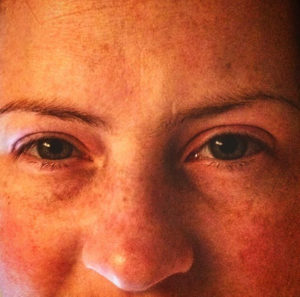Written for The Big Bible Project on 28th April 2012.
Her beauty comes from a deep reservoir of wisdom, simplicity and character. Yes she is, in my subjective opinion, what our culture would deem ‘attractive’ (if we pay any attention to such things) but this pales into insignificance at the un-nameable, indescribable and mysterious ‘sparkle’ in her eyes. Oh that I could paint in words the sight of those silvery wells, the blue-ness that is ever changing, swirling and dynamic! Or to describe the sensation of the dissipation of fear, anxiety or concern when you gaze, for one moment, into them.
There’s this peace… yes ‘peace’ is the word… emanating from her always. This is not to say that she is never stressed, panicked, impassioned or whatever the opposite of ‘peace’ is. She possesses an acceptance, a foundation; a belief that shapes her, that directs her actions and her responses to all that life throws at her. She has attained at the tender age of 25 a deep understanding of a narrative, a story, which explains that ‘sparkle’.

My wife has always been ‘broken’, weak in the eyes of the world. With chronic C.F. (cystic fibrosis) she has always had an ‘abnormal’ life of medication, physiotherapy, visits to medical experts, probing, testing. She has always had the curse of death named over her. When she was first born, the hope of surviving past adolescence was small. When she finally reached that age, due to advances in medicine, her hopes of prolonged survival were improved, but with all chronic illnesses, her mortality is never far away.
The ‘curse’ of Death is a powerful one, one that cripples a person from ever attaining fullness of life. It’s a curse that our society is particularly stricken by; our crematoriums are always on the outskirts of populated areas, they are places only visited on the rare occasions when someone we know dies. People rarely witness or engage in the process of dying and death. The burial of a loved one is now paid for financially and delegated to professionals who hide all the difficult and ‘offensive’ parts of death from us. Even before we die we seem to spend our lives staving off the inevitable end. We want to be younger, we hide our difficult aging relatives and we praise those who maintain a ‘younger’ lifestyle.
But then it happens… We face it. We look into the cold stare of mortality and we buckle. The responses are many and diverse but maybe the one, for me, that is a) the most common and b) the most upsetting: “Death is nothing at all…” This poem, a classic in funeral services and an edited version of a larger sermon, suggests the best response to death is to ignore it, be strong in the face of it by not bowing to its demands that you weep or cry. So where is hope? Where is the power of the resurrection? The resurrection is seen in the narrative, which frames my wife’s existence.
Christ’s death and resurrection marked the conquering over death. What does this mean? That death no longer exists? No! Clearly not. The power of the resurrection doesn’t destroy death to the point of non-existence but does something far more powerful. It redeems the death event into one of blessing rather than curse.
I talked, in the past, about redemption not in terms of hiding the scars or removing them but rather changing the pain association of them into things of celebration; signs of weakness becoming signs of victory. Death, in the redemption of the resurrection, becomes the important agency by which we receive ‘new life’. ‘New life’ is the gift of resurrection. In order to claim this we must experience death.
The narrative that my wife lives within is that death is no longer a curse, something to be avoided or feared but rather an important event towards gaining ‘new life’ but not just at the moment of biological death. She experiences death now and, because it is no longer feared or avoided, she embraces more of life.
But this too is platitudes; an opiate of a different kind.
No. Within this narrative also we are able to embrace the wonder, the fragility, and the reverence of life (to quote Albert Schweitzer). It forces death to step into the light of our experience and be acknowledged. The misty unknown stretching before us is stared at and we call it what it is. We cry, but we now own our tears as a process of grief and we articulate to ourselves that the pain of separation is real but necessary and is now under the sovereignty of God. We can talk openly about it. We can laugh at it. We can proclaim, “Where, O Death, is your sting.” More than that. We stare at it and it now brings us to appreciate the power of life, to see, maybe for the first time the beauty of life. Not in an existentialist “Drink and be merry for tomorrow we die,” but in a realistic seeking of the life that is hidden; our eyes opening to see that the ‘life’ we thought we had is nothing but dry death. ‘New life’ is something wholly other than that. It is seen in my wife’s eyes; resurrection life.
So when my wife dies, I will cry. I will cry until my eyes sting and I struggle for air to sustain my weeping. I will, after my energy is spent, stare into space contemplating memories. I will catch myself holding onto her belongings for a moment too long, which then will grow, inevitably into a minute, an hour, a day? All this is part of the process and I will name it all. I will speak out the truth
She is gone and I am not afraid.